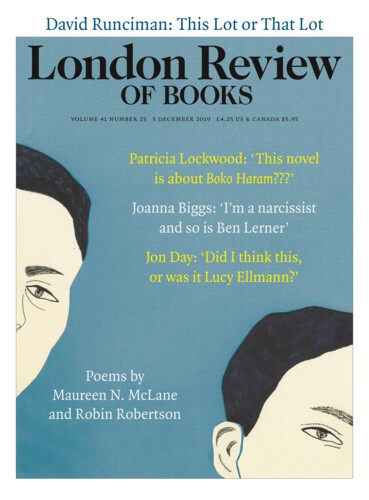for Maggie Fergusson
Four years old, I was, when her thrawn mood finally snapped.
‘What you staring at? That daft face on you.
You’re always gawking, always querious.
Watch the wind doesn’t change, or you’ll stay like that…’
So I stayed and watched the wind so long I became it;
became it, for its very changing.
My sklent eye took in everything –
the fear, the wonder of this world:
the haughland; the simmer dim; that broken bird
like a furtive Christ, moving, in the half-light, tree to tree;
the fox on the beach, the deer at gaze, the bite of fire
at the gorse-field; the way men passed the dead
through a hole they’d made in the wall, then closed it fast
against the soul returning. Snow-wreaths
in the high hills, the low lochs steaming in the dawn;
the way a living girl would take my hand and walk.
At what point does beauty start to terrify –
when we’re shown it doesn’t last, and we only find its opposite,
know the happiest days of our life have already passed?
And now I see too much – eyes far ben, as Mother always said –
watching them walking, the ghosts of the dead,
but seeing also the ghosts of the living: each one of them
that’s already caught their death. Co-walker, double-ganger,
the swarth, the taibse, the fetch.
I have the curse and gift: the two sights.
My sister has a drib of it too – a sixth sense, the second sight –
but her eye is kinder.
Last year, on her birthday evening – her love
long away on some far ocean – she climbed
above the summer shielings to find
her secret patch of averins, the cloudberries,
to see if they were ripe, to read them for their signs.
Was he still fine and halesome? His skin firm, and sweet?
And as she reached to pull a berry, a knife
fell from the sky and stuck, sair-sunk in the plant.
When her sailor man came home the next spring, he told her
how he’d stood that same night at the ship’s rail, paring a fruit,
looking over the side at the ocean, thinking of her.
And in his dwam he dropped it, his favourite knife
with the ivory handle, into the deep.
She went to her pocket and opened a napkin,
and there was the knife that he’d lost.
All I see, now, is everything that’s lost.
At the kirk last Sabbath: three gone in one day. Old Jeanie
sitting there in the family pew, there but not there.
We looked at each other, but her seat was empty.
Iain, the lobsterman, at the back of the chapel, his head
glowing with the waterburn, the sea-light, that flare
of phosphorescence; jacket dripping, sea-water in those shoes
all trachled in a creel, and there, about his mouth,
a string of pearls.
I sat along from Iseabail of the blue eyes, the girl
I’d wearied for all my life, her eyes gone white;
waited by her bed for five days after, as the sickness took,
as she died for good:
watching the flesh of her arm dimpling now and then
as if pressed in by fingers, a shadow sometimes
crossing her face, as if someone bent in for a kiss.
Old folk, hollowed out and grey, the baby in the lochan,
the red suicides, the boy with the withered hands.
Every face is the face of a gravestone, spalling away.
I’ll drink enough to block it out: be blind.
Till I go to the looking-glass and see nothing:
just empty space and the other wall, behind.
Send Letters To:
The Editor
London Review of Books,
28 Little Russell Street
London, WC1A 2HN
letters@lrb.co.uk
Please include name, address, and a telephone number.

